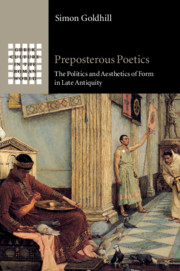Book contents
- Preposterous Poetics
- Greek Culture in the Roman World
- Preposterous Poetics
- Copyright page
- Contents
- Preface
- Acknowledgements
- Chapter 1 Forms of Attention
- Chapter 2 When Size Matters
- Chapter 3 In the Beginning
- Chapter 4 Preposterous Poetics and the Erotics of Death
- Chapter 5 Strange Dogs
- Chapter 6 Life Forms
- Coda
- References
- General Index
- Locorum Index
Chapter 5 - Strange Dogs
Joseph and Aseneth and the Dynamics of Transformation
Published online by Cambridge University Press: 27 August 2020
- Preposterous Poetics
- Greek Culture in the Roman World
- Preposterous Poetics
- Copyright page
- Contents
- Preface
- Acknowledgements
- Chapter 1 Forms of Attention
- Chapter 2 When Size Matters
- Chapter 3 In the Beginning
- Chapter 4 Preposterous Poetics and the Erotics of Death
- Chapter 5 Strange Dogs
- Chapter 6 Life Forms
- Coda
- References
- General Index
- Locorum Index
Summary
The central text to be discussed in this chapter is a short, strange, Greek prose work, about which the most fundamental questions remain unresolved. The text is known as Joseph and Aseneth, and it narrates the story of the marriage of the biblical figure of Joseph and his subsequent rule in Egypt. It has been stridently contested whether the work was written from within a Jewish milieu and can be dated as early as the second century BCE, or whether it is a Christian text from as late as the fourth century CE. Moreover, whatever the date or the provenance of Joseph and Aseneth, it is unclear even what the text is for – it cannot be determined what its genre is, or, more productively, how we should understand its function. This is a text that has proved highly provocative for classicists and religious studies scholars, for all that it has never entered the canon of classical literature or the history of religion. One aim of this chapter is not so much to reclaim Joseph and Aseneth for the canon, as to diagnose the ideology that has led to its exclusion.
- Type
- Chapter
- Information
- Preposterous PoeticsThe Politics and Aesthetics of Form in Late Antiquity, pp. 149 - 193Publisher: Cambridge University PressPrint publication year: 2020

